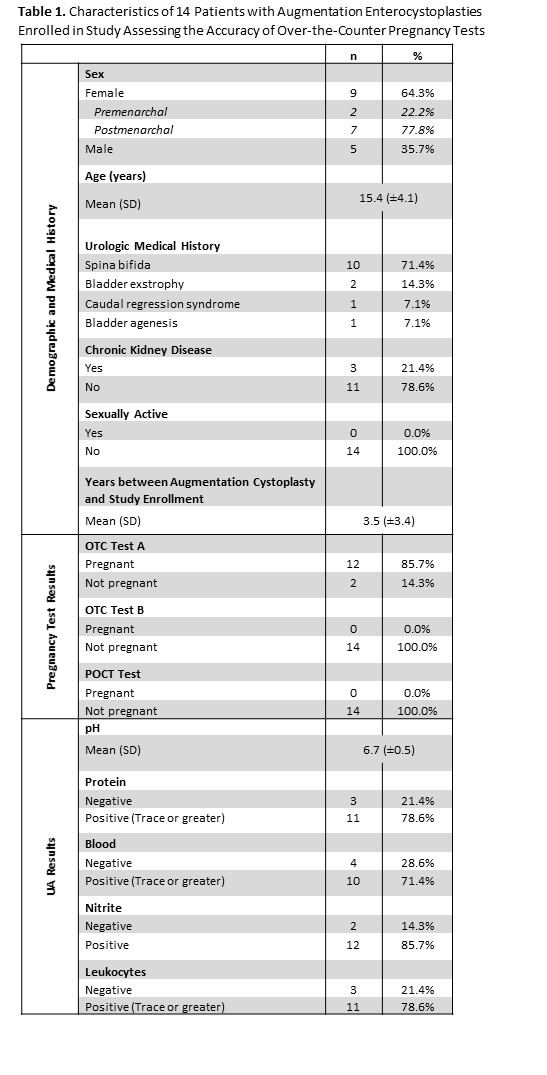Back
Poster, Podium & Video Sessions
Moderated Poster
MP11: Pediatric Urology: Neurogenic Bladder, Reconstruction & Urologic Emergencies
MP11-03: False Positive Pregnancy Tests among Pediatric Patients with Augmentation Enterocystoplasties
Friday, May 13, 2022
1:00 PM – 2:15 PM
Location: Room 225
Zoë Baker, Arthi Hannallah*, Hannah Dillon, Yuding Wang, Evalynn Vasquez, Los Angeles, CA
- AH
Poster Presenter(s)
Introduction: A high number of false positive pregnancy test results have been self-reported among patients with augmentation enterocystoplasties using over-the-counter (OTC) urine pregnancy tests. We sought to determine the accuracy of OTC pregnancy tests among pediatric patients who had previously undergone augmentation enterocystoplasties.
Methods: Patients at a tertiary care pediatric hospital who had previously undergone augmentation enterocystoplasties or Mitrofanoff appendicovesicostomies only were prospectively recruited. Urine samples were obtained and two OTC pregnancy tests, one point of care testing (POCT) urine pregnancy test, and urinalysis (UA) were completed. All pregnancy tests qualitatively assessed human chorionic gonadotropin (hCG). OTC Test A was a sandwich immunoassay employing monoclonal anti-ß-hCG, goat anti-rabbit, anti-a-hCG, and rabbit Immunoglobulin G (IgG) antibodies and using chromatography to separate bound and free colored label. OTC Test B was a lateral flow immunoassay dipstick containing mouse monoclonal anti-ß-hCG antibody colloidal gold conjugate pre-dried on a pad, mouse monocolonal anti-a-hCG antibodies, and goat anti-mouse IgG. The POCT test employed mouse monoclonal anti-hCG antibodies and goat polyclonal anti-hCG antibodies.
Results: Among 14 pediatric patients who had undergone augmentation cystoplasty, 12 (85.7%) had positive pregnancy test results on OTC Test A, including all 9 females and 60% of males (n=3/5; Table 1). No patients had positive pregnancy test results on OTC Test B or the POCT pregnancy test (Table 1). No false positive OTC pregnancy test results occurred among 4 patients with Mitrofanoff appendicovesicostomies only. Among patients with enterocystoplasties, UA results indicated that the majority had at least trace levels of protein, blood, and leukocytes, most tested positive for nitrite, and mean urine pH was 6.7 (±0.5; Table 1).
Conclusions: Preliminary findings indicate that certain OTC pregnancy tests qualitatively assessing hCG in urine may be inaccurate among patients who have previously undergone augmentation enterocystoplasties. Female patients of reproductive age should be counseled regarding appropriate pregnancy testing options to avoid unplanned pregnancy scares or concerns about ectopic pregnancies.
Source of Funding: The Long Road Foundation

Methods: Patients at a tertiary care pediatric hospital who had previously undergone augmentation enterocystoplasties or Mitrofanoff appendicovesicostomies only were prospectively recruited. Urine samples were obtained and two OTC pregnancy tests, one point of care testing (POCT) urine pregnancy test, and urinalysis (UA) were completed. All pregnancy tests qualitatively assessed human chorionic gonadotropin (hCG). OTC Test A was a sandwich immunoassay employing monoclonal anti-ß-hCG, goat anti-rabbit, anti-a-hCG, and rabbit Immunoglobulin G (IgG) antibodies and using chromatography to separate bound and free colored label. OTC Test B was a lateral flow immunoassay dipstick containing mouse monoclonal anti-ß-hCG antibody colloidal gold conjugate pre-dried on a pad, mouse monocolonal anti-a-hCG antibodies, and goat anti-mouse IgG. The POCT test employed mouse monoclonal anti-hCG antibodies and goat polyclonal anti-hCG antibodies.
Results: Among 14 pediatric patients who had undergone augmentation cystoplasty, 12 (85.7%) had positive pregnancy test results on OTC Test A, including all 9 females and 60% of males (n=3/5; Table 1). No patients had positive pregnancy test results on OTC Test B or the POCT pregnancy test (Table 1). No false positive OTC pregnancy test results occurred among 4 patients with Mitrofanoff appendicovesicostomies only. Among patients with enterocystoplasties, UA results indicated that the majority had at least trace levels of protein, blood, and leukocytes, most tested positive for nitrite, and mean urine pH was 6.7 (±0.5; Table 1).
Conclusions: Preliminary findings indicate that certain OTC pregnancy tests qualitatively assessing hCG in urine may be inaccurate among patients who have previously undergone augmentation enterocystoplasties. Female patients of reproductive age should be counseled regarding appropriate pregnancy testing options to avoid unplanned pregnancy scares or concerns about ectopic pregnancies.
Source of Funding: The Long Road Foundation


.jpg)
.jpg)